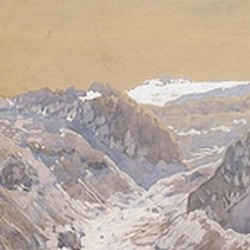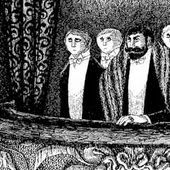- Details
Song of the week: Ich liebe dich (R. Strauss) - J. Kaufmann, H. Deutsch

Dear all, this week we're celebrating the 3rd anniversary of Liederabend. Three years is a long time on the blogosphere! I don't often post (blogging gurus recommend posting, at least, twice or three times a week), but I always manage to do it on time and I am glad to say that I have established a bond with my readers. A longtime friend who lives far from Barcelona (so we don't often meet) recently told me that finding my post every week was a way to hear from me. I like it.
During last year, we moved from the blog’s first "home", the platform Blogger; it was useful for a while but it became too small. On June 5th, I published the first post on this new home; it was a big job to change [...]
- Details
Song of the week: Motiv (E. Krenek) - M. Köhler, R. Schmiedel
 [...] Some texts of this Travelbook by Krenek refer to trivial issues such as those related to the inconveniences of tourism that make the listener smile for being so familiar. Criticism, irony or forwardness, comments about the weather, praises to drink, mood swings, philosophical reflections, customs can also be found. There is even a premonition of what was about to come to Germany at the Lied entitled Politik (Politics), in which Krenek makes a tragic appeal: "Ihr Bruder, schickt den blutigen Hanswurst endlich heim, beendet die Todesmaskerade, denn es ist genug jetzt!" (Brothers, send home once and for all the bloody clown, end this deadly masquerade, because enough is enough!). It seems pretty clear who was the "Bloody Clown" Krenek referred to when he composed this cycle in 1929, a few years before his exile in the US escaping from the Nazis.
[...] Some texts of this Travelbook by Krenek refer to trivial issues such as those related to the inconveniences of tourism that make the listener smile for being so familiar. Criticism, irony or forwardness, comments about the weather, praises to drink, mood swings, philosophical reflections, customs can also be found. There is even a premonition of what was about to come to Germany at the Lied entitled Politik (Politics), in which Krenek makes a tragic appeal: "Ihr Bruder, schickt den blutigen Hanswurst endlich heim, beendet die Todesmaskerade, denn es ist genug jetzt!" (Brothers, send home once and for all the bloody clown, end this deadly masquerade, because enough is enough!). It seems pretty clear who was the "Bloody Clown" Krenek referred to when he composed this cycle in 1929, a few years before his exile in the US escaping from the Nazis.- Details
Song of the week: Auf dem Hügel sitz ich spähend (L. van Beethoven) - P. Anders, M. Raucheisen
 The bicentenary of Gretchen am Spinnrade, regarded as the first romantic Lied, was celebrated not long ago; Schubert composed it on 19th of October in 1814 that symbolizes the birth of the genre. A year and a half later, in April 1816, Beethoven wrote what is considered the first relevant song cycle, An die ferne Geliebte. Beethoven's songs, such as those of Haydn and Mozart, are usually viewed as classical. Does that mean that any important work of a romantic genre becomes classical? I don't think we should worry about this apparent contradiction; cultural movements know no calendars, their boundaries are blurred and bordered artists come and go between styles. If I'm mentioning this it's because I've noticed that some people feel too lazy to listen to Beethoven's Lieder, as if not being clearly romantic, would diminish its merit or beauty. So, please don't miss this week's [...]
The bicentenary of Gretchen am Spinnrade, regarded as the first romantic Lied, was celebrated not long ago; Schubert composed it on 19th of October in 1814 that symbolizes the birth of the genre. A year and a half later, in April 1816, Beethoven wrote what is considered the first relevant song cycle, An die ferne Geliebte. Beethoven's songs, such as those of Haydn and Mozart, are usually viewed as classical. Does that mean that any important work of a romantic genre becomes classical? I don't think we should worry about this apparent contradiction; cultural movements know no calendars, their boundaries are blurred and bordered artists come and go between styles. If I'm mentioning this it's because I've noticed that some people feel too lazy to listen to Beethoven's Lieder, as if not being clearly romantic, would diminish its merit or beauty. So, please don't miss this week's [...]- Details
Song of the week: Wandrers Nachtlied I (F. Schubert) - F. Boesch, R. Vignoles
 After 2013, the year of Wagner and Britten, and 2014, the Year of Strauss, here is 2015, the Year of Sibelius and Schubert. We'll have some posts about Sibelius (it's about time!) to celebrate his 150th birth anniversary but we'll especially devote ourselves to Schubert (surprise, surprise!). We won’t commemorate any round anniversary of his birth or death but the bicentennial of his "year of miracles": during 1815, Schubert composed almost one hundred and fifty songs. We opened the celebrations in November, listening to a less-known Lied dated that year, Furcht der Geliebten; today we're listening to one of the most well-known Wandrers Nachtlied I (Wanderer's Nightsong I)
After 2013, the year of Wagner and Britten, and 2014, the Year of Strauss, here is 2015, the Year of Sibelius and Schubert. We'll have some posts about Sibelius (it's about time!) to celebrate his 150th birth anniversary but we'll especially devote ourselves to Schubert (surprise, surprise!). We won’t commemorate any round anniversary of his birth or death but the bicentennial of his "year of miracles": during 1815, Schubert composed almost one hundred and fifty songs. We opened the celebrations in November, listening to a less-known Lied dated that year, Furcht der Geliebten; today we're listening to one of the most well-known Wandrers Nachtlied I (Wanderer's Nightsong I)- Details
Song of the week: Stille Liebe (R. Schumann) - S. Keenlyside, M. Martineau
 In September, when the season starts and I’ve got my brand new notebook ready, the first thing I do is to schedule those posts that I’ve previously known: Christmas, St. George's Day, Easter, etc. This year, in addition, as I was so happy with the Art Song season in Barcelona, I wrote down some posts "about the song recital of XX". For next week, I had scheduled a post about Francis Poulenc, which was one of the composers included in the program of Simon Keenlyside's recital at the Gran Teatre del Liceu.
In September, when the season starts and I’ve got my brand new notebook ready, the first thing I do is to schedule those posts that I’ve previously known: Christmas, St. George's Day, Easter, etc. This year, in addition, as I was so happy with the Art Song season in Barcelona, I wrote down some posts "about the song recital of XX". For next week, I had scheduled a post about Francis Poulenc, which was one of the composers included in the program of Simon Keenlyside's recital at the Gran Teatre del Liceu.But on Monday 22th of December, the opera house announced the cancellation of that recital. Given that the previous Saturday Keenlyside had to withdraw from Rigoletto in Vienna due to illness (a withdrawal with [...]













